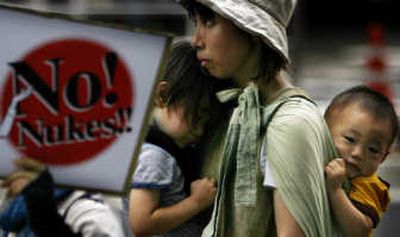Bush arrives in Japan for his last G-8 summit

TOYAKO, Japan – Global challenges like soaring oil prices and the Earth’s rising temperature await President Bush at a summit of top industrialized nations, but first he set out to soothe emotions on a sensitive Japanese issue that’s entangled in the nuclear standoff with North Korea.
Bush touched down in Japan today, his 62nd birthday, and he was flying aboard the Marine One presidential helicopter to the northern Japanese island of Hokkaido for his eighth and final Group of Eight summit. His first meeting is with Japanese Prime Minister Yasuo Fukuda.
The Japanese government is a key player in the six-party negotiations that led to North Korea’s recent declaration about its nuclear activities. Still, Japanese citizens are upset about the U.S. move to remove Pyongyang from the State Department’s terrorism blacklist in exchange for North Korea’s decision to admit to some of its weapons work.
Japan has long pushed for the resolution of North Korea’s kidnappings of Japanese citizens in the 1970s and ‘80s as a condition for sending aid and improving relations with the impoverished, reclusive communist nation. The abductees were apparently used to train North Korean agents in Japanese language and customs.
Knowing that the U.S. action would put a wrinkle in U.S.-Japanese relations, Bush called Fukuda just before the U.S., on June 26, announced its plan to ease sanctions against North Korea and take the country he once labeled as part of his “axis of evil” off the terrorism list. Bush told Fukuda the U.S. would continue to push North Korea to resolve the kidnapping issue.
“The Japanese public has very strong feelings about getting positive progress” on the abductee issue, Dennis Wilder, the National Security Council’s senior director for Asian Affairs, told reporters traveling with Bush aboard Air Force One. “The president has said we’re not going to forget that issue. … I think the Japanese prime minister will, of course, want to hear the president repeat those assurances.”
Before leaders began arriving for the summit, more than 1,000 people marched in northern Japan on Saturday to protest the event. Police arrested four protesters after a brief scuffle. Demonstrators at a park in central Sapporo demanded that the summit nations take urgent measures to stop global warming, grant indigenous people greater rights, combat world poverty and battle discrimination.
Fukuda has made climate change the centerpiece of the meetings involving leaders from the U.S., Japan, Germany, Britain, France, Italy, Russia and Canada. The Japanese prime minister, who suffers from low approval ratings, would like to emerge with an agreement on 50 percent overall reductions in greenhouse gases by 2050.